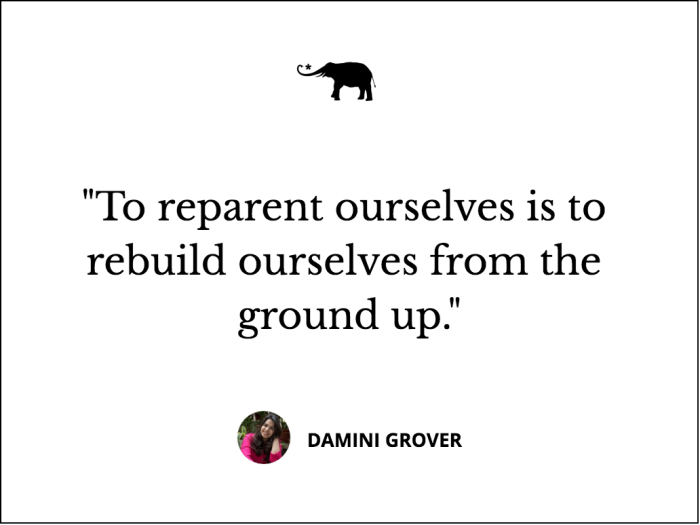
“Even in times of trauma, we try to maintain a sense of normality until we no longer can. That, my friends, is called surviving. Not healing. We never become whole again—we are survivors. If you are here today, you are a survivor. But those of us who have made it through hell and are still standing? We bear a different name: warriors.“ ~ Lori Goodwin
When we grow up and continue to live with an emotional vacuum, we don’t even realise how much of us it has already chipped off.
What should have been a stable, secure, connected being is reduced to a merely doing machine—disconnected from its own self and living a life that only feels hollow and empty every passing day.
Nothing makes sense, and even if it does, it seems pointless.
Why shouldn’t it be this way?
A child relies on the adults around him/her for support, stability, holding, and validation—of not just words, emotions, or actions but of its entire being, and when that doesn’t happen, the child is left to fend for its own self.
They grow up stumbling, staggering, with cuts, bruises, and wounds that eventually become bigger than his/her own being. The mere identity of this child is reduced to the love, affection, and nurturance they never got or understood.
We, as children, don’t know how to love ourselves. We cannot even begin talking about self-love without a fundamental understanding of what love is. And in this world, who of us understands love—truly, genuinely, and completely?
If we did, we wouldn’t all be victims walking around.
We don’t even realise that being emotionally deprived can and does have life-altering and defining consequences.
This deprivation makes us wander into our life spaces aimlessly with open wounds that are screaming to be attended to and healed. Sadly, this deprivation makes us deaf to our own screams and numb to our own pain.
The question then really is, for how long can we continue to live a life that feels disconnected, alien, and devoid of any kind of nurturance?
For how long can we continue to expect someone to show up for us and nurture the inner child within?
Perhaps, the only way to move out of this deprivation is to move inward—i.e learn to reparent ourselves.
The only way is to become the adult in our life who wasn’t there or couldn’t give us the kind of nurturance that we needed and still need.
This means to:
>> Acknowledge and understand the ways in which we have been emotionally deprived and unaffirmed.
>> Recognise the ways in which our identity and being were not held, validated, and affirmed.
>> Go into the depths of our emotional pain, reach for the wounds, and tend to them like we would have wanted our caregivers or loved ones to do for us.
>> Allow ourselves to get in touch with our inner child that still yearns for that love, warmth, and connection and give that to our own self.
>> Let go of the notion that we’re not good enough or unworthy of love simply because someone else wasn’t able to see and validate us for who we were (and are).
>> Instead of constantly criticizing and rejecting parts of us that deprive us even more, accept ourselves without any judgement or labels.
>> Heal the hurts of the past and forgive others and our own selves.
>> Give ourselves what others couldn’t give us.
>> Embrace our emotions and emotional needs fully and completely.
To reparent ourselves is to rebuild ourselves from the ground up. It is to lay our own foundations on our own, with full ownership of who we are and want to be.
And yes, it all sounds too easy, but it isn’t. Perhaps, it’s not about being easy but worth it and fulfilling.
There’s a reason why the human mind is programmed to avoid pain and move toward pleasure. There’s a reason why we look for safety and security in every aspect of our lives. That’s also why after a point in time, our wounds become our safe space. Our pain becomes a companion.
We get used to it. It gets comfortable. It feels safe. Our own misery, pain, and emptiness feel familiar.
But safe and comfortable don’t mean fulfilling, right?
And that’s why we also have parts of us that are yearning for growth, fulfillment, and completion as well. We have the capacity and choice for both: living with emptiness and moving toward completion.
Leaving that painful yet safe space brings its own anxiety and discomfort for we don’t know what lies on the other side.
What lies on the other side is a part of us that is healed, whole, and complete—that has found itself in the depths of its own pain and has embraced it and emerged from it.
A version of us that understands what it is, what it wants, needs, and is adult enough to take care of its child within and can look back at what has gone with a sense of detachment.
A version that is no longer afraid of showing up in the world and asking for its well-deserved space and love.
For it’s the only love that heals, and loving ourselves then means to be able to give ourselves the love that we have always deserved.
“The whole point of being alive is to evolve into the complete person you were intended to be.” ~ Oprah Winfrey
~

 Share on bsky
Share on bsky





Read 36 comments and reply